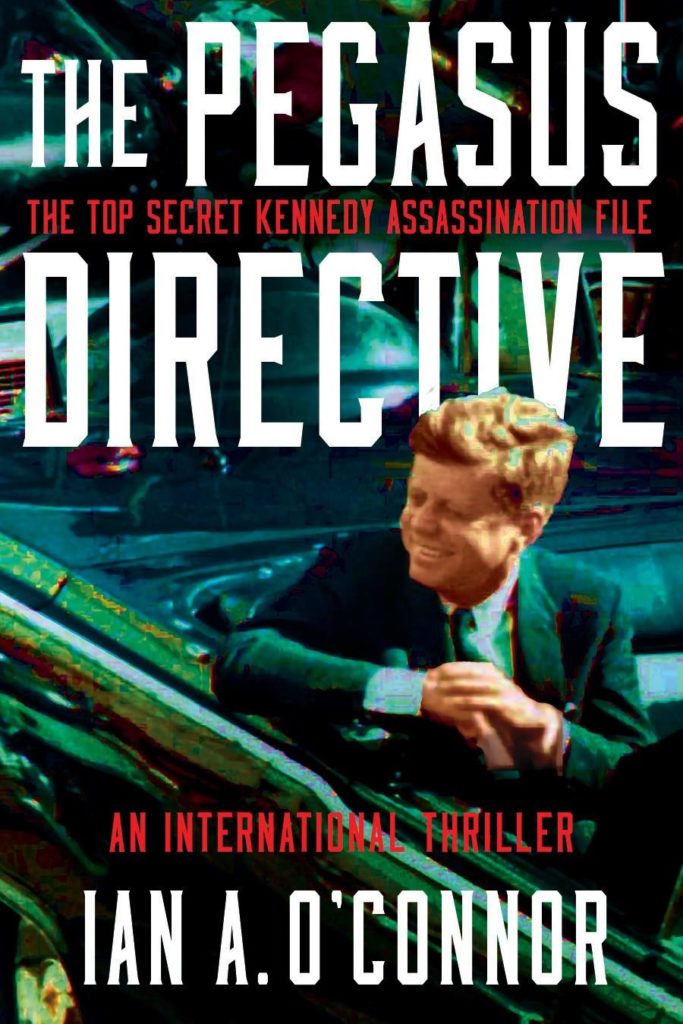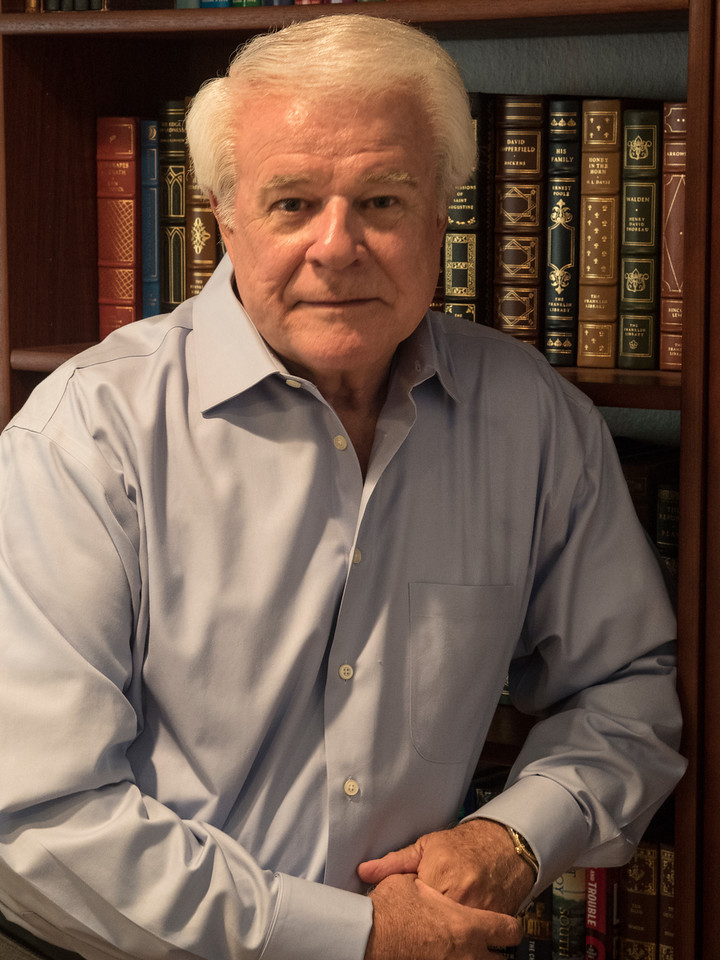Bio:
Ian A. O’Connor is the author of Point Option – A Military themed thriller which was the 2022 winner of the prestigious Silver Falchion Award for the year’s “Best Thriller.” The award was presented to Ian at the 15th Annual Nashville Writers Conference.
He is a retired USAF colonel, and a recognized expert in the field of national security management. This background serves him well as the foundation for his novels. He is the author of The Seventh Seal and The Barbarossa Covenant, both “Justin Scott Thrillers”. Kirkus Reviews wrote in high praise of Ian’s work: “The end result fits nicely into the Tom Clancy-meets-Dan Brown canon.” His co-authored book SCRAPPY: A Memoir of a Fighter Pilot in Korea and Vietnam, published by McFarland Publishing Company, which remains a favorite of the international military aviation community. It recounts the amazing career of Colonel Howard “Scrappy” Johnson, the 1958 Collier Trophy winner for the year’s most meritorious flight. His thriller, The Twilight of the Day, a harrowing tale of Vietnam pilot-POWs, was awarded a bronze medal by the Military Writers Society of America in 2018. Copies of both aforementioned books are found in the United States Naval Academy and United States Air Force Academy libraries.
His new novel, The Pegasus Directive, focuses on who really killed President John F. Kennedy and all the fiendish machinations behind the assassination. It will be out this Summer.
Ian is a member of Mystery Writers of America, and lives on Florida’s Treasure Coast with his wife, Candice.
—————————
What inspired you to become a writer, and when did you realize you wanted to pursue it as a career?
Always an avid reader, I finally decided to learn the fine art of fiction writing. I immersed myself in college-level writing courses, then attended workshops and seminars around the country, honing my craft under the tutelage of some of the genre’s most successful authors—including Florida International University Professor Les Standiford, author of Havana Run; James W. Hall, author of Forests of the Night; and retired Secret Service officer, Gerald Petievitch who wrote the memorable thriller, To Live and Die in L.A. And after a couple of intense years following this regimen, I knew the time had come to sit down and write.
Can you describe your typical writing process? Do you have any specific routines or habits that help you write?
I start with an inspirational idea captured from historical headlines. Not all of my ideas — or their historical headlines — bear fruit, and they must be cast aside before they drag me down a rabbit hole of no return. But once I realize that I’m onto something worthwhile, I will spend as long as a year doing research to get my facts right, then I begin the writing itself. The best habit I follow is consistency. When I’m writing, I make sure I go to my computer every morning just as I would go to a job, and work a full day. Of course, I do take breaks, but I find my mind is still hard at work even during those “down times” so it’s not hard for me to return and write for a couple of more hours before calling it a day.
How do you come up with the ideas for your stories or books?
More often than not, I get ideas for my novels from historical events. I then analyze those chosen events, break them down as to how they affected history, then I add my ten percent fiction to the ninety percent historical truth. And after a little more than a year of writing, editing, and a lot more writing, I have hopefully produced a book people will want to read.
Are there any authors or books that have particularly influenced your writing style or storytelling?
Four authors immediately come to mind who influenced my early career. First and foremost, was Ian Fleming. I was a young teenager when I discovered a copy of his “Casino Royale” in my father’s home library. That story set the groundwork for where I fantasized a writing career could go. Another was Frederick Forsyth, author of “Day of the Jackal.” That thriller is still a reader’s favorite fifty years later. A third author is Jeffrey Archer who wrote the international smash-hit, “Kane and Abel.” And lastly, there is Ken Follett, with his gripping tale, “Eye of the Needle.” These men all knew how to tell a riveting story, and I found myself hooked on the genre I wanted to write in.

What do you find most challenging about the writing process, and how do you overcome those challenges?
Without a doubt the hardest part about the writing process is “going to work” every day, but that is where discipline kicks in. Wring is a job, and in order to get paid, you must show up every day. Now, with that being said, I must admit that once seated at my computer and the creative juices have started to flow, I become immersed in a self-created world, and before I know it, several hours have passed, and I have added as much as a dozen pages to my manuscript. Nothing beats that sense of accomplishment.
Could you share a bit about your latest work? What was the inspiration behind it, and what do you hope readers will take away from it?
Year after year, the world’s three most frequently asked questions continue to be:
1. Who killed President John F. Kennedy?
2. Why was he killed?
3. How was it accomplished?
In my new thriller, “The Pegasus Directive,” I wrote that those answers came in May of 1972 from a Soviet spymaster seeking sanctuary at the Canadian Embassy in Rome. He told the ambassador at the time he wished to defect to the United States in exchange for perishable information he deemed critical to America’s continued well-being. There was just one caveat: He would only surrender to an American agent he knew solely by the code name Pegasus. What he revealed to Pegasus in trade for asylum was deemed so explosive by President Nixon, that it has remained among the world’s most closely guarded secrets—until now.
Why do you feel JFK’s death is still so relevant today?
November 22, 1963 is a date that still haunts seventy percent of those asked today if they believe Lee Harvey Oswald acted alone in killing President John F. Kennedy. Their answer is a resounding “NO!” When questioned further, they believe the truth remains stubbornly elusive, and they want to know why. To many it is seen as the crime of the century, and they insist the time has come for resolution. And that was the impetus for me writing “The Pegasus Directive,” to give readers a satisfying resolution to an unsolved mystery.
Do you have a favorite character from your own books, and if so, why is that character special to you?
I must admit that I grew fond of Justin Scott, the retired FBI agent, soon after introducing him in “The Seventh Seal.” He and I ‘clicked’ and a closeness grew. Justin is also the protagonist in my follow-on “The Barbarossa Covenant.” Justin plays a pivotal role in “The Pegasus Directive,” and will be seen again as the protagonist in “The Masada Option”, scheduled for release next spring, or early summer.
How do you handle criticism or negative feedback about your writing?
Let’s be honest, it ain’t easy! Whether it be rejection from an agent, a publisher, or a reader, that kind of news tends to put a damper on anyone’s day. But you must remind yourself for the umpteenth time that every author has suffered through such “slings and arrows ” at one time or another. It comes with the territory. And after reflection, there are many times when you must admit that the criticism was justified. But then you resolve to strive to write better, plot better, and tell your next story that much better.
Can you share some of your favorite books or authors outside of your own work?
Brad Meltzer is at the top of my list with his 2023 just-published historical thriller, “The Nazi Conspiracy.” And what writer would leave Lee Child and his larger-than-life Jack Reacher protagonist off of any shortlist of current influential writers? Then there’s Tess Gerritsen, the really gifted writer of “Listen to Me,” the latest book in her hit-series Rizzoli & Isles. I’ve been fortunate to have met each of them at different writers’ conferences over the years, and each gave generously of their time to encourage me and many others to just stick with it. Thriller writers are simply the best, especially when it comes to supporting fellow travelers!
What advice would you give to aspiring authors who are just starting on their writing journey?
My first bit of advice is to learn the craft of writing from professionals. What do I mean by this? The professionals are those established, successful writers whose books we all enjoy reading, and you will find many famous ones at Writers Conferences. Oftentimes they will sit on panels where they share advice on how to write a winning story. But they will also stress to the new writers in the crowd the need to learn the basics, which means taking writing classes, joining writers’ groups, and writing, writing, writing. I would add: do not expect to become an overnight success, but if you persevere, the day will come when an agent or editor says “yes” to a work you have submitted. That’s the day you know you’re finally a writer, and well on the way to becoming the author you’ve dreamed about becoming.
What impact did JFK, Jackie O and the JFK family have on the American people and our culture?
Sixty years have passed since the death of President Kennedy, but the intervening years have failed to diminish or dull the mystique which surrounded JFK, Jackie Kennedy, and to a lesser extent, the other members of the family. Opinion polls still tell us that over 70 percent of people when asked, feel a profound sense that America lost something irreplaceable that day in Dallas. Some go further, suggesting it was the moment America lost its innocence, and its pride in being the country the rest of the world aspired to emulate. That void is waiting to be filled.
For more information on Ian and his work, please visit: https://ianaoconnor.com/



